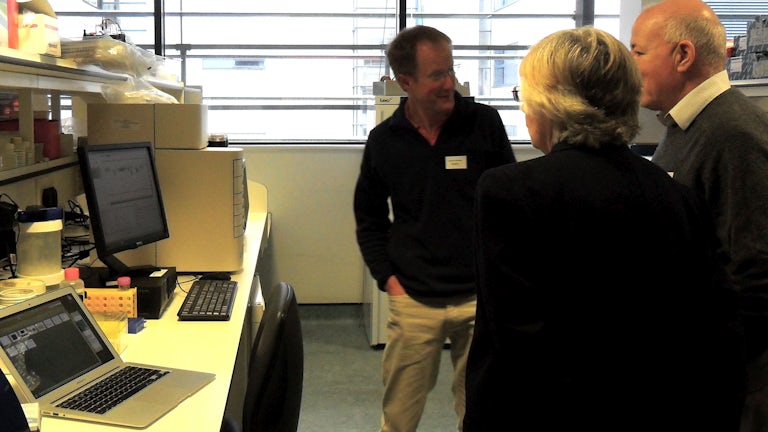We study the molecular events underlying chronic lymphocytic leukaemia (CLL), the most common leukaemia in the Western World with the aim of developing novel therapies and diagnostic tools.
CLL is the most common leukaemia in the Western World. It has no known cause and a very heterogeneous course. Some patients needing treatment quickly while others remain symptom free for many years.
We are an internationally competitive, multidiciplinary research team. This team is built on interactive collaboration between clinicians and basic scientists which has resulted in the application of cutting-edge technologies to address clinically relevant questions.
For the latest news and stories, please visit our blog.
Research
Drug resistance and clonal evolution
CLL represents and unruvalled primary human tumour model for investigating apoptotic signalling pathways and the molecular mechanisms that promote drug resistance. The ability to derive serial samples from individual patients also facilitates the analysis of tumour evolution at the genetic, transcription and proteomic levels. Consequently, these two areas of investigation are the focus of the team.
Drug resistance
More than 10 years ago we described the pivotal role of the Bcl-2 family of apoptosis-regulating proteins in determining the clinical outcome of CLL. The function and clinical relevance of this family of proteins remains a strong interest within our research group.
Clonal evolution
We are also addressing questions relating to cytogenetic instability and clonal evolution. This work began by investigating the role of CD38 expression on differential proliferation and cytogenetic instability but is now focused on the role of telomere dynamics in driving disease progression.
Diagnostic and prognostic markers
CLL is the most common leukaemia in Europe and is responsible for approximately 5000 deaths each year. It has a variable clinical course that is often difficult to predict at diagnosis.
Consequently, the identification of novel prognostic markers that can prospectively define patient sub-groups is an important element of our research programme. Most recently we have identified and validated two new prognostic markers in this disease, the NF-kB subunit ReIA and the anti-apoptotic protein Mcl-1.
Drug discovery and development
As a group we have a strong interest in the identification and development of novel therapeutic agents for the treatment of CLL.
To this end, we have forged key academic and pharmaceutical collaborations that have resulted in the development of six new therapeutic agents to date including antisense oligonucleotides against Bcl-2 (now in phase III clinical trials), novel cyclin-dependent kinase inhibitors (one now in phase II clinical trials) and a 'next generation' sequence selective DNA cross-linking agent (phase I clinical trial).
Leukaemia immunology
A major obstacle to successful cancer immunotherapy is the suppression or tolerance induced in T cells by cancer cells. We have productive collaborations to study mechanisms of immune suppression.
For CLL, we found that patients frequently demonstrated expansion in their CD8+ T cell subset (4). This caused an inversion in the CD4:CD8 ratio, and such patients had poorer clinical prognosis (4). The CD8+T cells in CLL patients were enriched for terminally differentiated T cells, and for PD-1 expression, suggesting immune dysfunction. We are currently investigating the function and specificity of this expanded T cell subset.
Another major research theme is the identification of tumour antigens applicable to a broad range of cancers. We isolated a CD8+ T cell clone, recognising a peptide epitope derived from the ubiquitous Bax protein that recognised primary chronic lymphocytic leukaemia cells (5). The concept underlying this discovery has been patented by Cardiff University, and further studies exploring the therapeutic potential of Bax specific T cells are in progress.
Meet the team
Academic staff
Associated staff
Publications
- Britt-Compton, B. et al. 2012. Extreme telomere erosion in ATM-mutated and 11q-deleted CLL patients is independent of disease stage [Letter]. Leukemia 26 (4), pp.826-830. (10.1038/leu.2011.281)
- Nunes, C. T. et al. 2011. A novel tumor antigen derived from enhanced degradation of Bax protein in human cancers. Cancer Research 71 (16), pp.5435-5444. (10.1158/0008-5472.CAN-11-0393)
- Lin, T. T. et al. 2010. Telomere dysfunction and fusion during the progression of chronic lymphocytic leukemia: evidence for a telomere crisis. Blood 116 (11), pp.1899-1907. (10.1182/blood-2010-02-272104)
- Hewamana, S. et al. 2009. Rel A is an independent biomarker of clinical outcome in chronic lymphocytic leukemia. Journal of Clinical Oncology 27 (5), pp.763-769. (10.1200/JCO.2008.19.1114)
- Pepper, C. J. et al. 2008. Mcl-1 expression has in vitro and in vivo significance in chronic lymphocytic leukemia and is associated with other poor prognostic markers. Blood 112 (9), pp.3807-3817. (10.1182/blood-2008-05-157131)
Funding
We are supported with grants from:
- Bloodwise (formerly Leukaemia and Lymphoma Research)
- Leukaemia Research Appeal for Wales
- Cancer Research Wales
- Cancer Research UK
Some of the students and projects are funded by:
- Welsh Government
- Saudi Arabian Government
We have, in the past, received funding from:
- Libyan Government

Schools
Images
Next steps
Research that matters
Our research makes a difference to people’s lives as we work across disciplines to tackle major challenges facing society, the economy and our environment.
Postgraduate research
Our research degrees give the opportunity to investigate a specific topic in depth among field-leading researchers.
Our research impact
Our research case studies highlight some of the areas where we deliver positive research impact.






